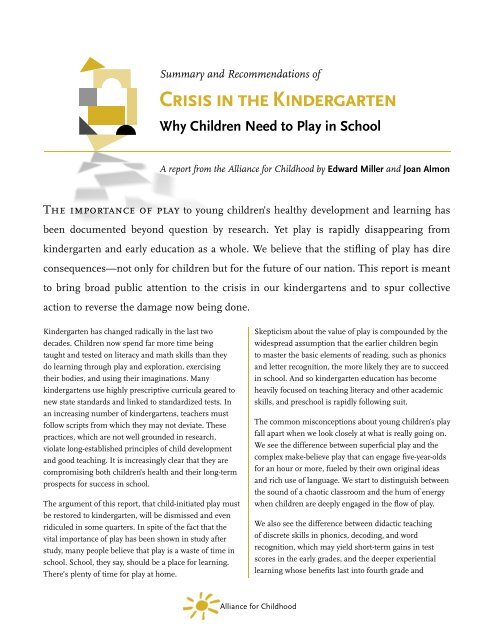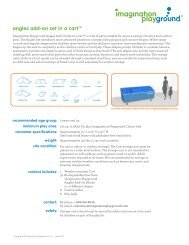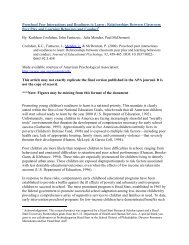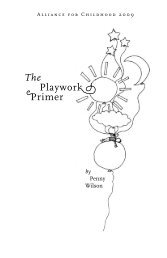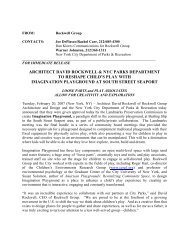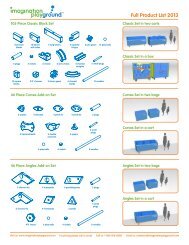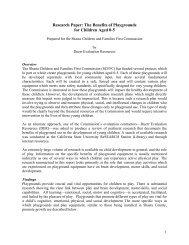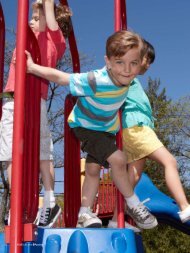Crisis in the Kindergarten: Why Children Need to Play ... - The Strong
Crisis in the Kindergarten: Why Children Need to Play ... - The Strong
Crisis in the Kindergarten: Why Children Need to Play ... - The Strong
Create successful ePaper yourself
Turn your PDF publications into a flip-book with our unique Google optimized e-Paper software.
Summary and Recommendations of<br />
<strong>Crisis</strong> <strong>in</strong> <strong>the</strong> K<strong>in</strong>dergarten<br />
<strong>Why</strong> <strong>Children</strong> <strong>Need</strong> <strong>to</strong> <strong>Play</strong> <strong>in</strong> School<br />
A report from <strong>the</strong> Alliance for Childhood by Edward Miller and Joan Almon<br />
<strong>The</strong> importance of play <strong>to</strong> young children’s healthy development and learn<strong>in</strong>g has<br />
been documented beyond question by research. Yet play is rapidly disappear<strong>in</strong>g from<br />
k<strong>in</strong>dergarten and early education as a whole. We believe that <strong>the</strong> stifl<strong>in</strong>g of play has dire<br />
consequences—not only for children but for <strong>the</strong> future of our nation. This report is meant<br />
<strong>to</strong> br<strong>in</strong>g broad public attention <strong>to</strong> <strong>the</strong> crisis <strong>in</strong> our k<strong>in</strong>dergartens and <strong>to</strong> spur collective<br />
action <strong>to</strong> reverse <strong>the</strong> damage now be<strong>in</strong>g done.<br />
K<strong>in</strong>dergarten has changed radically <strong>in</strong> <strong>the</strong> last two<br />
decades. <strong>Children</strong> now spend far more time be<strong>in</strong>g<br />
taught and tested on literacy and math skills than <strong>the</strong>y<br />
do learn<strong>in</strong>g through play and exploration, exercis<strong>in</strong>g<br />
<strong>the</strong>ir bodies, and us<strong>in</strong>g <strong>the</strong>ir imag<strong>in</strong>ations. Many<br />
k<strong>in</strong>dergartens use highly prescriptive curricula geared <strong>to</strong><br />
new state standards and l<strong>in</strong>ked <strong>to</strong> standardized tests. In<br />
an <strong>in</strong>creas<strong>in</strong>g number of k<strong>in</strong>dergartens, teachers must<br />
follow scripts from which <strong>the</strong>y may not deviate. <strong>The</strong>se<br />
practices, which are not well grounded <strong>in</strong> research,<br />
violate long-established pr<strong>in</strong>ciples of child development<br />
and good teach<strong>in</strong>g. It is <strong>in</strong>creas<strong>in</strong>gly clear that <strong>the</strong>y are<br />
compromis<strong>in</strong>g both children’s health and <strong>the</strong>ir long-term<br />
prospects for success <strong>in</strong> school.<br />
<strong>The</strong> argument of this report, that child-<strong>in</strong>itiated play must<br />
be res<strong>to</strong>red <strong>to</strong> k<strong>in</strong>dergarten, will be dismissed and even<br />
ridiculed <strong>in</strong> some quarters. In spite of <strong>the</strong> fact that <strong>the</strong><br />
vital importance of play has been shown <strong>in</strong> study after<br />
study, many people believe that play is a waste of time <strong>in</strong><br />
school. School, <strong>the</strong>y say, should be a place for learn<strong>in</strong>g.<br />
<strong>The</strong>re’s plenty of time for play at home.<br />
Skepticism about <strong>the</strong> value of play is compounded by <strong>the</strong><br />
widespread assumption that <strong>the</strong> earlier children beg<strong>in</strong><br />
<strong>to</strong> master <strong>the</strong> basic elements of read<strong>in</strong>g, such as phonics<br />
and letter recognition, <strong>the</strong> more likely <strong>the</strong>y are <strong>to</strong> succeed<br />
<strong>in</strong> school. And so k<strong>in</strong>dergarten education has become<br />
heavily focused on teach<strong>in</strong>g literacy and o<strong>the</strong>r academic<br />
skills, and preschool is rapidly follow<strong>in</strong>g suit.<br />
<strong>The</strong> common misconceptions about young children’s play<br />
fall apart when we look closely at what is really go<strong>in</strong>g on.<br />
We see <strong>the</strong> difference between superficial play and <strong>the</strong><br />
complex make-believe play that can engage five-year-olds<br />
for an hour or more, fueled by <strong>the</strong>ir own orig<strong>in</strong>al ideas<br />
and rich use of language. We start <strong>to</strong> dist<strong>in</strong>guish between<br />
<strong>the</strong> sound of a chaotic classroom and <strong>the</strong> hum of energy<br />
when children are deeply engaged <strong>in</strong> <strong>the</strong> flow of play.<br />
We also see <strong>the</strong> difference between didactic teach<strong>in</strong>g<br />
of discrete skills <strong>in</strong> phonics, decod<strong>in</strong>g, and word<br />
recognition, which may yield short-term ga<strong>in</strong>s <strong>in</strong> test<br />
scores <strong>in</strong> <strong>the</strong> early grades, and <strong>the</strong> deeper experiential<br />
learn<strong>in</strong>g whose benefits last <strong>in</strong><strong>to</strong> fourth grade and<br />
Alliance for Childhood
Summary & Recommendations<br />
beyond. Read<strong>in</strong>g First, <strong>the</strong> $6 billion federal program<br />
designed <strong>to</strong> help children from low-<strong>in</strong>come families,<br />
greatly <strong>in</strong>creased <strong>the</strong> amount of time children spent<br />
be<strong>in</strong>g taught discrete pre-read<strong>in</strong>g skills <strong>in</strong> k<strong>in</strong>dergarten<br />
and <strong>the</strong> early grades, but failed <strong>to</strong> improve read<strong>in</strong>g<br />
comprehension.<br />
<strong>Play</strong> Builds Competence <strong>in</strong> Many Doma<strong>in</strong>s<br />
Young children work hard at play. <strong>The</strong>y <strong>in</strong>vent scenes and<br />
s<strong>to</strong>ries, solve problems, and negotiate <strong>the</strong>ir way through<br />
social roadblocks. <strong>The</strong>y know what <strong>the</strong>y want <strong>to</strong> do and<br />
work diligently <strong>to</strong> do it. Because <strong>the</strong>ir motivation comes<br />
from with<strong>in</strong>, <strong>the</strong>y learn <strong>the</strong> powerful lesson of pursu<strong>in</strong>g<br />
<strong>the</strong>ir own ideas <strong>to</strong> a successful conclusion.<br />
Research shows that children who engage <strong>in</strong> complex<br />
forms of socio-dramatic play have greater language skills<br />
than nonplayers, better social skills, more empathy, more<br />
imag<strong>in</strong>ation, and more of <strong>the</strong> subtle capacity <strong>to</strong> know<br />
what o<strong>the</strong>rs mean. <strong>The</strong>y are less aggressive and show<br />
more self-control and higher levels of th<strong>in</strong>k<strong>in</strong>g.<br />
Long-term research casts doubt on <strong>the</strong> assumption that<br />
start<strong>in</strong>g earlier on <strong>the</strong> teach<strong>in</strong>g of phonics and o<strong>the</strong>r<br />
discrete skills leads <strong>to</strong> better results. For example, most of<br />
<strong>the</strong> play-based k<strong>in</strong>dergartens <strong>in</strong> Germany were changed<br />
<strong>in</strong><strong>to</strong> centers for cognitive achievement dur<strong>in</strong>g a wave of<br />
educational “reform” <strong>in</strong> <strong>the</strong> 1970s. But research compar<strong>in</strong>g<br />
50 play-based classes with 50 early-learn<strong>in</strong>g centers<br />
found that by age ten <strong>the</strong> children who had played <strong>in</strong><br />
k<strong>in</strong>dergarten excelled over <strong>the</strong> o<strong>the</strong>rs <strong>in</strong> a host of ways.<br />
<strong>The</strong>y were more advanced <strong>in</strong> read<strong>in</strong>g and ma<strong>the</strong>matics<br />
and <strong>the</strong>y were better adjusted socially and emotionally <strong>in</strong><br />
school. <strong>The</strong>y excelled <strong>in</strong> creativity and <strong>in</strong>telligence, oral<br />
expression, and “<strong>in</strong>dustry.” As a result of this study German<br />
k<strong>in</strong>dergartens returned <strong>to</strong> be<strong>in</strong>g play-based aga<strong>in</strong>.<br />
Ch<strong>in</strong>a and Japan are envied <strong>in</strong> <strong>the</strong> U.S. for <strong>the</strong>ir success<br />
<strong>in</strong> teach<strong>in</strong>g science, math, and technology. But one rarely<br />
hears about <strong>the</strong>ir approach <strong>to</strong> school<strong>in</strong>g before second<br />
grade, which is playful and experiential ra<strong>the</strong>r than didactic.<br />
F<strong>in</strong>land’s children, <strong>to</strong>o, go <strong>to</strong> playful k<strong>in</strong>dergartens,<br />
and <strong>the</strong>y enter first grade at age seven ra<strong>the</strong>r than six.<br />
<strong>The</strong>y enjoy a lengthy, playful early childhood. Yet F<strong>in</strong>land<br />
consistently gets <strong>the</strong> highest scores on <strong>the</strong> respected<br />
<strong>in</strong>ternational PISA exam for 15-year-olds.<br />
It is true that poverty does not afflict F<strong>in</strong>land’s children as<br />
it does children <strong>in</strong> <strong>the</strong> U.S., and that children of poverty<br />
need special attention <strong>in</strong> preschool and k<strong>in</strong>dergarten. But<br />
what <strong>the</strong>y need is extra support <strong>to</strong> reap <strong>the</strong> full benefits<br />
of a play-based, experiential program. <strong>The</strong>y may need<br />
more structure <strong>to</strong> beg<strong>in</strong> with and guidance for enter<strong>in</strong>g<br />
<strong>in</strong><strong>to</strong> play, for many are <strong>in</strong>experienced with it. <strong>The</strong>y need<br />
a solid <strong>in</strong>troduction <strong>to</strong> books, which most middle-class<br />
children have from <strong>in</strong>fancy onwards, and <strong>the</strong>y need <strong>to</strong><br />
hear language used <strong>in</strong> conversation, s<strong>to</strong>rytell<strong>in</strong>g, song,<br />
and verse. Equally important, <strong>the</strong>y need <strong>to</strong> use language.<br />
<strong>Play</strong> is <strong>the</strong> foremost way that children use <strong>the</strong> language<br />
<strong>the</strong>y are hear<strong>in</strong>g.<br />
All young children, not just those liv<strong>in</strong>g <strong>in</strong> poverty, need<br />
<strong>the</strong> support of teachers who understand <strong>the</strong> value of<br />
play. For <strong>the</strong> fact is that most children <strong>to</strong>day don’t have<br />
enough playtime even at home. Many affluent children<br />
now need help enter<strong>in</strong>g <strong>in</strong><strong>to</strong> creative play because of <strong>the</strong><br />
surfeit of media and organized activities <strong>in</strong> <strong>the</strong>ir lives.<br />
<strong>The</strong>y struggle <strong>to</strong> br<strong>in</strong>g <strong>the</strong>ir own ideas <strong>to</strong> <strong>the</strong> fore. As one<br />
k<strong>in</strong>dergarten teacher put it, “If I give <strong>the</strong> children time <strong>to</strong><br />
play, <strong>the</strong>y don’t know what <strong>to</strong> do. <strong>The</strong>y have no ideas of<br />
<strong>the</strong>ir own.”<br />
This is a tragedy, both for <strong>the</strong> children <strong>the</strong>mselves and for<br />
our nation and world. No human be<strong>in</strong>g can achieve his<br />
full potential if his creativity is stunted <strong>in</strong> childhood. And<br />
no nation can thrive <strong>in</strong> <strong>the</strong> 21st century without a highly<br />
creative and <strong>in</strong>novative workforce. Nor will democracy<br />
survive without citizens who can form <strong>the</strong>ir own <strong>in</strong>dependent<br />
thoughts and act on <strong>the</strong>m.<br />
How K<strong>in</strong>dergarten Has Changed<br />
<strong>The</strong> traditional k<strong>in</strong>dergarten classroom that most adults<br />
remember from childhood—with plenty of space and<br />
time for unstructured play and discovery, art and music,<br />
practic<strong>in</strong>g social skills, and learn<strong>in</strong>g <strong>to</strong> enjoy learn<strong>in</strong>g—<br />
has largely disappeared. <strong>The</strong> results of three new studies,<br />
supported by <strong>the</strong> Alliance for Childhood and described <strong>in</strong><br />
this report, suggest that time for play <strong>in</strong> most public k<strong>in</strong>dergartens<br />
has dw<strong>in</strong>dled <strong>to</strong> <strong>the</strong> vanish<strong>in</strong>g po<strong>in</strong>t, replaced<br />
by lengthy lessons and standardized test<strong>in</strong>g.<br />
<strong>The</strong> studies were conducted by researchers from<br />
U.C.L.A., Long Island University, and Sarah Lawrence<br />
2 C R I S I S I N T H E K I N D E R G A R T E N<br />
Alliance for Childhood
Summary & Recommendations<br />
Chart A: Daily K<strong>in</strong>dergarten Schedule <strong>in</strong> Two Cities Average number of m<strong>in</strong>utes spent daily <strong>in</strong> selected activities<br />
Literacy <strong>in</strong>struction<br />
75.8<br />
88.6<br />
Math <strong>in</strong>struction<br />
48.4<br />
46.9<br />
Test<strong>in</strong>g and test prep<br />
21<br />
26.4<br />
NEW YORK CITY<br />
LOS ANGELES<br />
Choice time<br />
19.1<br />
29.2<br />
0 10 20 30 40 50 60 70 80 90 100<br />
Number of m<strong>in</strong>utes spent<br />
College <strong>in</strong> New York. <strong>The</strong> researchers found that<br />
• On a typical day, k<strong>in</strong>dergartners <strong>in</strong> Los Angeles and<br />
New York City spend four <strong>to</strong> six times as long be<strong>in</strong>g<br />
<strong>in</strong>structed and tested <strong>in</strong> literacy and math (two <strong>to</strong><br />
three hours per day) as <strong>in</strong> free play or “choice time”<br />
(30 m<strong>in</strong>utes or less).<br />
• Standardized test<strong>in</strong>g and preparation for tests are<br />
now a daily activity <strong>in</strong> most of <strong>the</strong> k<strong>in</strong>dergartens studied,<br />
despite <strong>the</strong> fact that most uses of such tests with<br />
children under age eight are of questionable validity<br />
and can lead <strong>to</strong> harmful label<strong>in</strong>g.<br />
• Classic play materials like blocks, sand and water<br />
tables, and props for dramatic play have largely disappeared<br />
from <strong>the</strong> 268 full-day k<strong>in</strong>dergarten classrooms<br />
studied.<br />
• In many k<strong>in</strong>dergarten classrooms <strong>the</strong>re is no playtime<br />
at all. Teachers say <strong>the</strong> curriculum does not<br />
<strong>in</strong>corporate play, <strong>the</strong>re isn’t time for it, and many<br />
school adm<strong>in</strong>istra<strong>to</strong>rs do not value it.<br />
K<strong>in</strong>dergartners are now under great pressure <strong>to</strong> meet<br />
<strong>in</strong>appropriate expectations, <strong>in</strong>clud<strong>in</strong>g academic standards<br />
that until recently were reserved for first grade. At <strong>the</strong><br />
same time, <strong>the</strong>y are be<strong>in</strong>g denied <strong>the</strong> benefits of play—a<br />
major stress reliever. This double burden, many experts<br />
believe, is contribut<strong>in</strong>g <strong>to</strong> a rise <strong>in</strong> anger and aggression<br />
<strong>in</strong> young children, reflected <strong>in</strong> <strong>in</strong>creas<strong>in</strong>g reports of severe<br />
behavior problems. Given <strong>the</strong> high rates of psychiatric<br />
disturbances among children <strong>to</strong>day, it is critically<br />
important that early education practices promote physical<br />
and emotional health and not exacerbate illness.<br />
High-stakes test<strong>in</strong>g and test preparation <strong>in</strong> k<strong>in</strong>dergarten<br />
are proliferat<strong>in</strong>g, as schools <strong>in</strong>creas<strong>in</strong>gly are required <strong>to</strong><br />
make decisions on promotion, retention, and placement<br />
<strong>in</strong> gifted programs or special education classes on <strong>the</strong><br />
basis of test scores. Yet relatively few k<strong>in</strong>dergarten tests<br />
meet acceptable standards of reliability and validity. Standardized<br />
test<strong>in</strong>g of children under age eight, when used<br />
<strong>to</strong> make significant decisions about <strong>the</strong> child’s education,<br />
is <strong>in</strong> direct conflict with <strong>the</strong> professional standards of<br />
every educational test<strong>in</strong>g organization. Observational and<br />
curriculum-embedded performance assessments should<br />
be used <strong>in</strong>stead. <strong>The</strong> argument that standardized test<strong>in</strong>g<br />
takes less time and is <strong>the</strong>refore more efficient is called<br />
<strong>in</strong><strong>to</strong> question by new data suggest<strong>in</strong>g that teachers are<br />
now spend<strong>in</strong>g 20 <strong>to</strong> 30 m<strong>in</strong>utes per day prepar<strong>in</strong>g k<strong>in</strong>dergarten<br />
children <strong>to</strong> take standardized tests.<br />
Alliance for Childhood<br />
C R I S I S I N T H E K I N D E R G A R T E N<br />
3
Summary & Recommendations<br />
Long-Term Implications of <strong>the</strong><br />
Disappearance of <strong>Play</strong><br />
<strong>The</strong> n<strong>in</strong>e new studies and analyses on which this report is<br />
based all po<strong>in</strong>t <strong>to</strong> <strong>the</strong> same conclusion: k<strong>in</strong>dergarten, long<br />
a beloved <strong>in</strong>stitution <strong>in</strong> American culture, is <strong>in</strong> crisis. If<br />
<strong>the</strong> problems are not recognized and remedied, <strong>the</strong> same<br />
ills will be passed on <strong>to</strong> preschools and even <strong>to</strong> programs<br />
for children ages birth <strong>to</strong> three.<br />
<strong>The</strong> implications of <strong>the</strong>se radical changes <strong>in</strong> early education<br />
practice reach far beyond schools. Until recently few<br />
people were talk<strong>in</strong>g about <strong>the</strong> long-term effects of <strong>the</strong><br />
disappearance of children’s play. Now, while many politicians<br />
and policymakers are call<strong>in</strong>g for even more tests,<br />
more accountability, and more hard-core academics <strong>in</strong><br />
early childhood classrooms, <strong>the</strong> leaders of major bus<strong>in</strong>ess<br />
corporations are say<strong>in</strong>g that creativity and play are <strong>the</strong><br />
future of <strong>the</strong> U.S. economy.<br />
Daniel P<strong>in</strong>k, author of A Whole New M<strong>in</strong>d, writes about<br />
<strong>the</strong> “imag<strong>in</strong>ation economy,” and says that “people have<br />
<strong>to</strong> be able <strong>to</strong> do someth<strong>in</strong>g that can’t be outsourced,<br />
someth<strong>in</strong>g that’s hard <strong>to</strong> au<strong>to</strong>mate and that delivers on<br />
<strong>the</strong> grow<strong>in</strong>g demand for nonmaterial th<strong>in</strong>gs like s<strong>to</strong>ries<br />
and design. Typically <strong>the</strong>se are th<strong>in</strong>gs we associate with<br />
<strong>the</strong> right side of <strong>the</strong> bra<strong>in</strong>, with artistic and empa<strong>the</strong>tic<br />
and playful sorts of abilities.” How can we expect our<br />
Too many schools place a double<br />
burden on young children.<br />
First, <strong>the</strong>y heighten <strong>the</strong>ir<br />
stress by demand<strong>in</strong>g that <strong>the</strong>y<br />
master material beyond <strong>the</strong>ir<br />
developmental level. <strong>The</strong>n <strong>the</strong>y<br />
deprive children of <strong>the</strong>ir chief<br />
means of deal<strong>in</strong>g with that stress—<br />
creative play.<br />
children <strong>to</strong> thrive <strong>in</strong> <strong>the</strong> imag<strong>in</strong>ation economy of <strong>the</strong><br />
future if we deny <strong>the</strong>m opportunities for play and<br />
creativity <strong>in</strong> k<strong>in</strong>dergarten?<br />
We recognize that <strong>the</strong> res<strong>to</strong>ration of child-<strong>in</strong>itiated play<br />
<strong>to</strong> early education will not by itself solve <strong>the</strong> complex<br />
problems of help<strong>in</strong>g all children—especially those with<br />
special needs or <strong>in</strong> poor families and neglected schools,<br />
as well as English-language learners—<strong>to</strong> reach <strong>the</strong>ir full<br />
potential. We are not call<strong>in</strong>g for a simple return <strong>to</strong> <strong>the</strong><br />
practices of an earlier time. We now understand much<br />
better <strong>the</strong> k<strong>in</strong>ds of rich experiences that young children<br />
need <strong>in</strong> order <strong>to</strong> become avid learners. Teachers need <strong>to</strong><br />
understand <strong>the</strong> ways <strong>in</strong> which child-<strong>in</strong>itiated play when<br />
comb<strong>in</strong>ed with playful, experiential learn<strong>in</strong>g leads <strong>to</strong><br />
lifelong benefits <strong>in</strong> ways that didactic drills, standardized<br />
tests, and scripted teach<strong>in</strong>g do not.<br />
Strik<strong>in</strong>g a Healthy Balance<br />
In a healthy k<strong>in</strong>dergarten, play does not mean “anyth<strong>in</strong>g<br />
goes.” It does not deteriorate <strong>in</strong><strong>to</strong> chaos. Nor is play so<br />
tightly structured by adults that children are denied <strong>the</strong><br />
opportunity <strong>to</strong> learn through <strong>the</strong>ir own <strong>in</strong>itiative and<br />
exploration. K<strong>in</strong>dergartners need a balance of child-<strong>in</strong>itiated<br />
play <strong>in</strong> <strong>the</strong> presence of engaged teachers and more<br />
focused experiential learn<strong>in</strong>g guided by teachers.<br />
Early childhood researchers Elena Bodrova and Deborah<br />
Leong, <strong>in</strong> <strong>the</strong> September 2005 issue of Educational Leadership,<br />
described <strong>the</strong> problems with one-sided approaches<br />
<strong>to</strong> k<strong>in</strong>dergarten:<br />
In our experiences, we have found that both<br />
extremely chaotic classrooms and extremely<br />
teacher-directed classrooms are counterproductive<br />
<strong>to</strong> develop<strong>in</strong>g self-regulation and o<strong>the</strong>r underly<strong>in</strong>g<br />
skills <strong>in</strong> children. Classrooms where children flit<br />
from activity <strong>to</strong> activity support reactive behavior. But<br />
when all <strong>the</strong> <strong>in</strong>struction is whole-group, students<br />
become <strong>to</strong>o teacher-regulated.<br />
We call for educa<strong>to</strong>rs, <strong>the</strong>ir professional organizations,<br />
and policymakers <strong>to</strong> develop as fully as possible <strong>the</strong><br />
two central methods <strong>in</strong> <strong>the</strong> cont<strong>in</strong>uum (illustrated<br />
on <strong>the</strong> follow<strong>in</strong>g page) of approaches <strong>to</strong> k<strong>in</strong>dergarten<br />
education:<br />
4 C R I S I S I N T H E K I N D E R G A R T E N<br />
Alliance for Childhood
Summary & Recommendations<br />
<strong>the</strong> k<strong>in</strong>dergarten cont<strong>in</strong>uum<br />
Laissez-Faire,<br />
Loosely Structured<br />
Classroom<br />
Classroom Rich <strong>in</strong><br />
Child-Initiated <strong>Play</strong><br />
<strong>Play</strong>ful Classroom<br />
with Focused Learn<strong>in</strong>g<br />
Didactic,<br />
Highly Structured<br />
Classroom<br />
Ample play but without<br />
active adult support, often<br />
result<strong>in</strong>g <strong>in</strong> chaos<br />
Explor<strong>in</strong>g <strong>the</strong> world through<br />
play with <strong>the</strong> active<br />
presence of teachers<br />
Teachers guid<strong>in</strong>g learn<strong>in</strong>g<br />
with rich, experiential<br />
activities<br />
Teacher-led <strong>in</strong>struction,<br />
<strong>in</strong>clud<strong>in</strong>g scripted teach<strong>in</strong>g,<br />
with little or no play<br />
<strong>The</strong> creation of a healthy balance described above has<br />
been blocked by current policies and government-imposed<br />
practices and programs, <strong>in</strong>clud<strong>in</strong>g No Child Left<br />
Beh<strong>in</strong>d and Read<strong>in</strong>g First. <strong>The</strong>se well-<strong>in</strong>tentioned but<br />
fundamentally flawed mandates rely on test<strong>in</strong>g and on<br />
didactic and scripted approaches—especially for teach<strong>in</strong>g<br />
children from low-<strong>in</strong>come backgrounds—<strong>in</strong> spite<br />
of <strong>the</strong> fact that <strong>the</strong>se practices are not well supported by<br />
research evidence. Indeed, many of <strong>the</strong> current approaches<br />
<strong>to</strong> k<strong>in</strong>dergarten education are based on unfounded<br />
assumptions and preconceptions about what is best for<br />
children and schools.<br />
“<strong>The</strong> problem is not political but ideological,” writes Lilian<br />
Katz, who directed <strong>the</strong> ERIC Clear<strong>in</strong>ghouse on Elementary<br />
and Early Childhood Education for 30 years. “Ideologies<br />
are deeply held beliefs that fill <strong>the</strong> vacuum created by<br />
<strong>the</strong> unavailability of hard data. Our best strategy <strong>in</strong> such<br />
situations is <strong>to</strong> make our ideas and <strong>the</strong> data that we do<br />
have readily available <strong>to</strong> o<strong>the</strong>rs who can subject <strong>the</strong>m <strong>to</strong><br />
vigorous argument and debate.”<br />
If we are <strong>to</strong> best serve children and <strong>to</strong> foster <strong>the</strong> full<br />
professional development of early childhood educa<strong>to</strong>rs,<br />
we must reject an ideological approach <strong>to</strong> teach<strong>in</strong>g young<br />
children, consider all <strong>the</strong> evidence of decades of research<br />
and experience—not just <strong>the</strong> results of a few narrow tests<br />
of suspect validity—and beg<strong>in</strong> a thorough reassessment<br />
of our k<strong>in</strong>dergarten policies and practices.<br />
Creat<strong>in</strong>g <strong>the</strong> <strong>Play</strong>ful K<strong>in</strong>dergarten<br />
When children are given a chance <strong>to</strong> <strong>in</strong>itiate play and<br />
explora<strong>to</strong>ry learn<strong>in</strong>g, <strong>the</strong>y become highly skilled <strong>in</strong> <strong>the</strong><br />
art of self-education and self-regulation. <strong>The</strong> role of <strong>the</strong><br />
teacher <strong>in</strong> support<strong>in</strong>g such an approach is subtler and<br />
more profound than <strong>the</strong> didactic or scripted pedagogue.<br />
She is attuned <strong>to</strong> <strong>the</strong> children’s play <strong>the</strong>mes and builds<br />
on <strong>the</strong>m, <strong>in</strong>troduc<strong>in</strong>g new content and play materials<br />
<strong>to</strong> stimulate <strong>the</strong>ir m<strong>in</strong>ds. She knows <strong>the</strong> needs of<br />
<strong>in</strong>dividual children and helps <strong>the</strong>m overcome obstacles<br />
<strong>in</strong> <strong>the</strong>ir lives that h<strong>in</strong>der learn<strong>in</strong>g. <strong>The</strong> play-based approach<br />
calls for teachers <strong>to</strong> know each child well and <strong>to</strong><br />
differentiate <strong>the</strong> teach<strong>in</strong>g methods <strong>to</strong> meet <strong>in</strong>dividual<br />
needs. It is <strong>the</strong> anti<strong>the</strong>sis of <strong>the</strong> one-size-fits-all model<br />
of education.<br />
Early childhood professionals recognize that <strong>the</strong> k<strong>in</strong>dergartner<br />
is an “emerg<strong>in</strong>g” learner <strong>in</strong> literacy, math, and<br />
o<strong>the</strong>r areas. Guidel<strong>in</strong>es developed at <strong>the</strong> Bank Street<br />
College of Education expla<strong>in</strong> that emerg<strong>in</strong>g readers often<br />
know some letter names and words but might recognize<br />
<strong>the</strong>m <strong>in</strong> one context and not <strong>in</strong> ano<strong>the</strong>r. <strong>The</strong> emerg<strong>in</strong>g<br />
reader realizes that those pr<strong>in</strong>ted squiggles on <strong>the</strong><br />
page have mean<strong>in</strong>g, even if he doesn’t yet know many of<br />
<strong>the</strong> mean<strong>in</strong>gs. Build<strong>in</strong>g a bridge from oral language <strong>to</strong><br />
written language is vital <strong>in</strong> k<strong>in</strong>dergarten. But <strong>the</strong> bridge<br />
must be built on a strong foundation of oral language and<br />
imag<strong>in</strong>ative th<strong>in</strong>k<strong>in</strong>g, which are developed through play.<br />
Alliance for Childhood<br />
C R I S I S I N T H E K I N D E R G A R T E N<br />
5
Summary & Recommendations<br />
Teachers and parents can safely look ahead <strong>to</strong> second and<br />
third grade, when children typically become “early fluent”<br />
or “fluent” readers, without expect<strong>in</strong>g all of <strong>the</strong>m <strong>to</strong> be<br />
read<strong>in</strong>g <strong>in</strong>dependently <strong>in</strong> k<strong>in</strong>dergarten. Look<strong>in</strong>g ahead<br />
without push<strong>in</strong>g ahead means <strong>in</strong>troduc<strong>in</strong>g books, <strong>the</strong><br />
alphabet, and o<strong>the</strong>r elements of literacy <strong>in</strong> playful ways,<br />
without <strong>the</strong> burden of long hours of drill and test<strong>in</strong>g <strong>to</strong><br />
meet <strong>in</strong>appropriate standards.<br />
<strong>The</strong> skilled k<strong>in</strong>dergarten teacher makes sure <strong>the</strong><br />
classroom supports diverse forms of play, <strong>in</strong>clud<strong>in</strong>g<br />
large- and small-mo<strong>to</strong>r play, imag<strong>in</strong>ative play, rough and<br />
tumble play, and rules-based play. Each of <strong>the</strong>se develops<br />
important abilities. <strong>The</strong> playful k<strong>in</strong>dergarten supports<br />
<strong>the</strong>m all.<br />
A challenge <strong>in</strong> educat<strong>in</strong>g teachers for playful k<strong>in</strong>dergartens<br />
is that many younger teachers did not grow up<br />
with a strong experience of child-<strong>in</strong>itiated play. <strong>The</strong>ir<br />
free time was filled with electronic media and organized<br />
activities. <strong>The</strong>y will need <strong>to</strong> experience play <strong>the</strong>mselves<br />
<strong>to</strong> understand its role <strong>in</strong> effective education. <strong>The</strong> same<br />
can be said of younger parents. A major task—but<br />
a reward<strong>in</strong>g one—is <strong>to</strong> help parents and educa<strong>to</strong>rs<br />
recapture <strong>the</strong> spirit of play.<br />
<strong>The</strong> power of play as <strong>the</strong> eng<strong>in</strong>e of learn<strong>in</strong>g <strong>in</strong> early<br />
childhood and as a vital force for young children’s<br />
physical, social, and emotional development is beyond<br />
question. <strong>Children</strong> <strong>in</strong> play-based k<strong>in</strong>dergartens have<br />
a double advantage over those who are denied play:<br />
<strong>the</strong>y end up equally good or better at read<strong>in</strong>g and o<strong>the</strong>r<br />
<strong>in</strong>tellectual skills, and <strong>the</strong>y are more likely <strong>to</strong> become<br />
well-adjusted healthy people.<br />
Every child deserves a chance <strong>to</strong> grow and learn <strong>in</strong> a<br />
play-based, experiential preschool and k<strong>in</strong>dergarten.<br />
<strong>Play</strong> works.<br />
Recommendations for Creat<strong>in</strong>g Effective and Healthy<br />
K<strong>in</strong>dergartens<br />
To create effective and healthy k<strong>in</strong>dergartens we call on<br />
policymakers, educa<strong>to</strong>rs, health professionals, researchers,<br />
and parents <strong>to</strong> take action as follows:<br />
1. Res<strong>to</strong>re child-<strong>in</strong>itiated play and experiential learn<strong>in</strong>g<br />
with <strong>the</strong> active support of teachers <strong>to</strong> <strong>the</strong>ir rightful<br />
place at <strong>the</strong> heart of k<strong>in</strong>dergarten education.<br />
• Provide time and space for play <strong>to</strong> k<strong>in</strong>dergartners<br />
every school day, both <strong>in</strong>doors and dur<strong>in</strong>g recess.<br />
• Make room <strong>in</strong> k<strong>in</strong>dergarten for all types of play that<br />
contribute <strong>to</strong> children’s development, <strong>in</strong>clud<strong>in</strong>g<br />
make-believe, sensory, language, construction, large-<br />
and small-mo<strong>to</strong>r, and mastery play.<br />
• Engage parents and educa<strong>to</strong>rs <strong>in</strong> discussion of <strong>the</strong><br />
role of play and experiential learn<strong>in</strong>g <strong>in</strong> healthy and<br />
effective k<strong>in</strong>dergartens, so that <strong>the</strong>y can advocate for<br />
play with school adm<strong>in</strong>istra<strong>to</strong>rs and policymakers.<br />
2. Reassess k<strong>in</strong>dergarten standards <strong>to</strong> ensure that <strong>the</strong>y<br />
promote developmentally appropriate practices, and<br />
elim<strong>in</strong>ate those that do not.<br />
• Replace one-size-fits-all k<strong>in</strong>dergarten standards with<br />
flexible guidel<strong>in</strong>es based on well-grounded knowledge<br />
of children’s cognitive, social, emotional,<br />
physical, and creative development.<br />
• Recognize <strong>the</strong> differences between <strong>the</strong> k<strong>in</strong>dergarten<br />
child who is an emergent reader and <strong>the</strong> first-grade<br />
child who has become an early reader. Recognize<br />
similar differences <strong>in</strong> children’s learn<strong>in</strong>g of math,<br />
science, and o<strong>the</strong>r <strong>to</strong>pics. Do not expect k<strong>in</strong>dergarten<br />
children <strong>to</strong> achieve academic goals best suited <strong>to</strong><br />
first-graders.<br />
• Change developmentally <strong>in</strong>appropriate practices that<br />
cause normal child behavior and learn<strong>in</strong>g patterns <strong>to</strong><br />
be wrongly labeled as misbehavior, attention disorders,<br />
or learn<strong>in</strong>g disabilities.<br />
• Elim<strong>in</strong>ate <strong>the</strong> practice of k<strong>in</strong>dergarten retention<br />
based on <strong>in</strong>ability <strong>to</strong> meet rigid standards or <strong>to</strong> pass a<br />
particular test.<br />
6 C R I S I S I N T H E K I N D E R G A R T E N<br />
Alliance for Childhood
Summary & Recommendations<br />
3. End <strong>the</strong> <strong>in</strong>appropriate use <strong>in</strong> k<strong>in</strong>dergarten of standardized<br />
tests, which are prone <strong>to</strong> serious error especially<br />
when given <strong>to</strong> children under age eight.<br />
• Use alternatives <strong>to</strong> standardized assessments <strong>in</strong> k<strong>in</strong>dergarten,<br />
such as teacher observations and assessment<br />
of children’s work. Educate teachers <strong>in</strong> <strong>the</strong> use<br />
of <strong>the</strong>se alternatives and <strong>in</strong> <strong>the</strong> risks and limitations<br />
of standardized test<strong>in</strong>g of young children.<br />
• Do not make important decisions about young children,<br />
<strong>the</strong>ir teachers, or <strong>the</strong>ir schools based solely or<br />
primarily on standardized test scores.<br />
4. Expand <strong>the</strong> early childhood research agenda <strong>to</strong> exam<strong>in</strong>e<br />
<strong>the</strong> long-term impact of current preschool and<br />
k<strong>in</strong>dergarten practices on <strong>the</strong> development of children<br />
from diverse backgrounds.<br />
• Evaluate current k<strong>in</strong>dergarten practices with qualitative<br />
as well as quantitative methods. Such research<br />
should assess children’s overall health and <strong>the</strong>ir cognitive,<br />
social, emotional, and physical development at<br />
least until fourth grade.<br />
• Replicate on a much larger scale <strong>the</strong> quantitative<br />
studies of k<strong>in</strong>dergarten use of time and materials<br />
described <strong>in</strong> Chapter 2 of this report so that a representative<br />
sample of teachers <strong>in</strong> many different areas<br />
contribute <strong>to</strong> <strong>the</strong> full picture of current k<strong>in</strong>dergarten<br />
practices.<br />
• Investigate <strong>the</strong> associations between developmentally<br />
<strong>in</strong>appropriate k<strong>in</strong>dergarten practices and behavioral<br />
and psychiatric disturbances and o<strong>the</strong>r health problems<br />
among young children.<br />
5. Give teachers of young children first-rate preparation<br />
that emphasizes <strong>the</strong> full development of <strong>the</strong> child and<br />
<strong>the</strong> importance of play, nurtures children’s <strong>in</strong>nate love<br />
of learn<strong>in</strong>g, and supports teachers’ own capacities for<br />
creativity, au<strong>to</strong>nomy, and <strong>in</strong>tegrity.<br />
and o<strong>the</strong>r support <strong>in</strong> learn<strong>in</strong>g how <strong>to</strong> encourage and<br />
support play, especially with children who have had<br />
limited opportunity <strong>to</strong> engage <strong>in</strong> creative play or who<br />
have poor self-regulation skills.<br />
• Help teachers communicate with parents about <strong>the</strong><br />
importance of play and ways <strong>to</strong> support it at home<br />
and <strong>in</strong> <strong>the</strong> community.<br />
6. Use <strong>the</strong> crisis of play’s disappearance from<br />
k<strong>in</strong>dergarten <strong>to</strong> rally organizations and <strong>in</strong>dividuals<br />
<strong>to</strong> create a national movement for play <strong>in</strong> schools<br />
and communities.<br />
• Work across traditional boundaries of profession,<br />
geography, and <strong>in</strong>terest group <strong>to</strong> advocate for play <strong>in</strong><br />
classrooms, after-school and camp programs, parks<br />
and playgrounds, neighborhoods and cities.<br />
• Establish local, state, and national play policies that<br />
recognize <strong>the</strong> importance of play for children of all<br />
ages—<strong>in</strong>clud<strong>in</strong>g <strong>the</strong> ways that play enhances physical,<br />
social, emotional, and cognitive development.<br />
• Address <strong>the</strong> obstacles <strong>to</strong> play, such as unsafe neighborhoods,<br />
overschedul<strong>in</strong>g of children’s lives, excessive<br />
screen time, <strong>to</strong>ys l<strong>in</strong>ked <strong>to</strong> enterta<strong>in</strong>ment media,<br />
and education that emphasizes skills, drills, and<br />
homework and underm<strong>in</strong>es creativity, imag<strong>in</strong>ation,<br />
and overall well-be<strong>in</strong>g.<br />
<strong>The</strong> Alliance for Childhood’s Call <strong>to</strong> Action on <strong>the</strong> Education<br />
of Young <strong>Children</strong> has been signed by hundreds of<br />
educa<strong>to</strong>rs and health professionals, <strong>in</strong>clud<strong>in</strong>g many<br />
leaders <strong>in</strong> <strong>the</strong>se fields. <strong>The</strong> Call <strong>to</strong> Action and a complete<br />
list of signers can be found at <strong>the</strong> Alliance’s web site:<br />
www.allianceforchildhood.org.<br />
• Make course work <strong>in</strong> child development and <strong>the</strong> use<br />
of play <strong>in</strong> <strong>the</strong> classroom manda<strong>to</strong>ry <strong>in</strong> early childhood<br />
education programs.<br />
• Give teachers professional development, men<strong>to</strong>r<strong>in</strong>g,<br />
Alliance for Childhood<br />
C R I S I S I N T H E K I N D E R G A R T E N<br />
7
About <strong>the</strong> Alliance for Childhood<br />
<strong>The</strong> Alliance for Childhood is a nonprofit partnership<br />
of educa<strong>to</strong>rs, health professionals, and o<strong>the</strong>r advocates<br />
for children who are concerned about <strong>the</strong> decl<strong>in</strong>e <strong>in</strong><br />
children’s health and well-be<strong>in</strong>g and who share a sense<br />
that childhood itself is endangered. <strong>The</strong> Alliance was<br />
founded <strong>in</strong> 1999 and is <strong>in</strong>corporated <strong>in</strong> <strong>the</strong> state of<br />
Maryland. It is funded entirely by grants and donations<br />
from <strong>in</strong>dividuals, foundations, and bus<strong>in</strong>esses.<br />
<strong>The</strong> Alliance promotes policies and practices that support<br />
children’s healthy development, love of learn<strong>in</strong>g, and joy<br />
<strong>in</strong> liv<strong>in</strong>g. Our public education campaigns br<strong>in</strong>g <strong>to</strong> light<br />
both <strong>the</strong> promise and <strong>the</strong> vulnerability of childhood. We<br />
act for <strong>the</strong> sake of <strong>the</strong> children <strong>the</strong>mselves and for a more<br />
just, democratic, and ecologically responsible future.<br />
<strong>The</strong> Alliance’s campaign <strong>to</strong> res<strong>to</strong>re play <strong>to</strong> k<strong>in</strong>dergartens<br />
and preschools is supported by an advisory board of<br />
dist<strong>in</strong>guished educa<strong>to</strong>rs and health professionals.<br />
<strong>Crisis</strong> <strong>in</strong> <strong>the</strong> K<strong>in</strong>dergarten<br />
<strong>Why</strong> <strong>Children</strong> <strong>Need</strong> <strong>to</strong> <strong>Play</strong> <strong>in</strong> School<br />
Copyright © 2009 by <strong>the</strong> Alliance for Childhood. All rights reserved.<br />
First pr<strong>in</strong>t<strong>in</strong>g March 2009 ISBN: 978-0-9823751-0-5<br />
<strong>The</strong> full report, and this summary, can be<br />
found at www.allianceforchildhood.org <strong>in</strong><br />
pdf format for download<strong>in</strong>g.<br />
A pr<strong>in</strong>t version of <strong>the</strong> full report is<br />
available for $16 postpaid. Please contact<br />
<strong>the</strong> Alliance for Childhood for more<br />
<strong>in</strong>formation.<br />
Alliance for Childhood<br />
P.O. Box 444<br />
College Park, MD 20741<br />
Tel/Fax 301.779.1033<br />
<strong>The</strong> Alliance for Childhood<br />
National Advisory Board<br />
Sue Bredekamp<br />
Direc<strong>to</strong>r of Research, Council for Professional<br />
Recognition, Wash<strong>in</strong>g<strong>to</strong>n, D.C.<br />
L<strong>in</strong>da Darl<strong>in</strong>g-Hammond<br />
Charles E. Ducommun Professor, Stanford University<br />
School of Education, Stanford, Calif.<br />
David Elk<strong>in</strong>d<br />
Professor Emeritus of Child Development,<br />
Tufts University, Medford, Mass.<br />
Margery B. Frankl<strong>in</strong><br />
Professor Emerita of Psychology and direc<strong>to</strong>r (retired),<br />
Child Development Institute,<br />
Sarah Lawrence College, Bronxville, N.Y.<br />
Kenneth G<strong>in</strong>sburg, M.D.<br />
Associate Professor of Pediatrics, University of<br />
Pennsylvania School of Medic<strong>in</strong>e, Philadelphia, Penn.<br />
Roberta M. Gol<strong>in</strong>koff<br />
H. Rodney Sharp Professor of Education,<br />
University of Delaware, Newark, Del.<br />
Kathy Hirsh-Pasek<br />
Deborah and Stanley Lefkowitz Professor of Psychology,<br />
Temple University, Philadelphia, Penn.<br />
Deborah Meier<br />
Senior Scholar, New York University, and founder,<br />
Central Park East Schools, New York City<br />
Samuel J. Meisels<br />
President, Erikson Institute, Chicago<br />
Sharna Olfman<br />
Professor of Psychology and found<strong>in</strong>g direc<strong>to</strong>r,<br />
Childhood and Society Symposium,<br />
Po<strong>in</strong>t Park University, Pittsburgh, Penn.<br />
Larry Schwe<strong>in</strong>hart<br />
President, High/Scope Educational Research<br />
Foundation, Ypsilanti, Mich.<br />
Dorothy G. S<strong>in</strong>ger<br />
Senior Research Scientist, Child Study Center,<br />
Yale University, New Haven, Conn.<br />
Jerome L. S<strong>in</strong>ger<br />
Professor Emeritus of Psychology,<br />
Yale University, New Haven, Conn.<br />
8 C R I S I S I N T H E K I N D E R G A R T E N<br />
Alliance for Childhood


